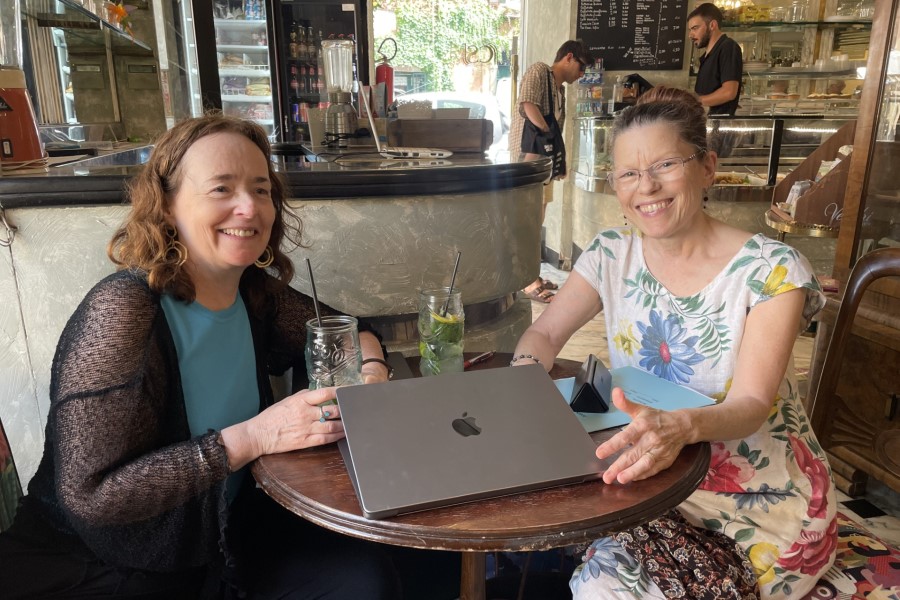Professor Fabrizio Conti Gives Talks at Iowa State University and the University of St. Thomas
On February 27 and March 1, Professor Fabrizio Conti was invited to give two talks in the United States, respectively at Iowa State University in Ames, Iowa, and the University of St. Thomas, in St. Paul, Minnesota. The lecture that Professor Conti presented at Iowa State was organized by the Departments of World Languages and Cultures, History, English, Philosophy and Religious Studies as well as by the Classical Studies Program and the Committee on Lectures, which is funded by Student Government, while the one at St. Thomas was supported by the College of Arts and Sciences, the Department of History, and the Office of Study Abroad.

At Iowa State, Professor Conti offered a discussion of a chapter he published in Humanisms and Beyond: Past, Present, and Future of the Humanities in Liberal Arts Education (Trivent, 2023), the volume he co-edited for JCU’s Department of History and Humanities, in which he showed how, while the humanities are often criticized as irrelevant or in decline, they in fact remain essential to fully understanding our modern world. In his talk, Professor Conti contextualized Renaissance Humanism, Classical traditions, and the humanities in general, in the history of education in the West, contending that these disciplines can help students to better understand themselves in a modern world that is becoming increasingly more complex and that therefore requires multidisciplinary skills such as the ones that a humanistic background can provide.
Professor Conti pointed out that, as highlighted by recent studies, these skills include complex problem-solving, sense-making, imagination, multimodal communication, cross-cultural competency, and leadership. The study of history, especially, according to Professor Conti, can guide a student to developing these skills, and discussing and researching complex cultural-historical topics, such as the development of witch-beliefs, can help the student to identify and make use of multidisciplinary paths of investigation. However, above all, Professor Conti concluded, the Humanities are about exercising what experts call soft skills. Referring to the example of the late Pier Massimo Forni, a professor of Italian at Johns Hopkins University and a co-founder of the Johns Hopkins Civility Project, fostering civility-based initiatives on university campuses around the USA, Professor Conti pointed out how much of the values of such a “civil” approach owe to the classical, humanistic, and Renaissance traditions. There is a line of humanitas-humanity, Professor Conti highlighted, that undoubtedly runs through the humanistic tradition and its pedagogical rediscovery, with its social and economic implications, seems to be powerful, as several entrepreneurs and top managers have by now realized, such as Brunello Cucinelli, the Italian “king of cashmere” and the proponent of “Humanistic Capitalism”, and Tim Cook, the CEO of Apple, among others.
This shows, Professor Conti concluded, that the humanities can benefit students, now and in the future, even (or especially) at a “university of science and technology” such as Iowa State.
See the recording of Professor Conti’s lecture at Iowa State University.
At the University of St. Thomas, Professor Conti discussed the relevance of the study of the humanities, and especially history, in the liberal arts university system, and more specifically, the cultural issues of magic and witchcraft. The study of magic and witchcraft, Professor Conti explained, can provide students with a great laboratory of historical and conceptual complexity, as well as the possibility to study how ideas and accusatory stereotypes are formed slowly over time, even over centuries, and how many other dynamics having to do with power relations and connections between distant cultures are linked to them.
Fabrizio Conti (Ph.D., Central European University, 2011) is a lecturer in History at John Cabot University as well as an Arts and Humanities Advisor at the American Academy in Rome. His teaching and research interests span the antique/late antique, medieval, and renaissance periods, with an interdisciplinary approach to cultural and religious developments and special focus on the history of magic and witchcraft. His publications include the monograph Witchcraft, Superstition, and Observant Franciscan Preachers: Pastoral Approach and Intellectual Debate in Renaissance Milan (Brepols, 2015), and the edited volumes: Humanisms and Beyond: Past, Present, and Future of the Humanities within Liberal Arts Education edited with Stefan Lorenz Sorgner (Trivent, 2023), with a Foreword by Franco Pavoncello; “Nemo Non Metuit”: Magic in the Roman World edited with Elizabeth Ann Pollard (Trivent, 2022), and Civilizations of the Supernatural: Witchcraft, Ritual, and Religious Experience in Late Antique, Medieval, and Renaissance Traditions (Trivent, 2020), with a Foreword by Teofilo F. Ruiz.





